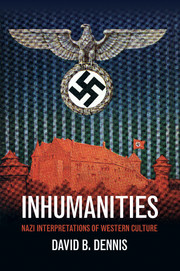Book contents
- Frontmatter
- Contents
- List of Illustrations
- Acknowledgments
- Introduction
- Part I Foundations of Nazi Cultural History
- Part II Blind to the Light
- 6 Classicism Romanticized
- 7 Intolerance toward Enlightenment
- 8 Forging Steel Romanticism
- 9 Romantic Music as “Our Greatest Legacy”
- Part III Modern Dilemmas
- Part IV “Holy” War and Weimar “Crisis”
- Part V Nazi “Solutions”
- Notes
- Index
6 - Classicism Romanticized
Published online by Cambridge University Press: 05 October 2012
- Frontmatter
- Contents
- List of Illustrations
- Acknowledgments
- Introduction
- Part I Foundations of Nazi Cultural History
- Part II Blind to the Light
- 6 Classicism Romanticized
- 7 Intolerance toward Enlightenment
- 8 Forging Steel Romanticism
- 9 Romantic Music as “Our Greatest Legacy”
- Part III Modern Dilemmas
- Part IV “Holy” War and Weimar “Crisis”
- Part V Nazi “Solutions”
- Notes
- Index
Summary
National Socialist attitudes toward the Western Classical tradition were complex. As George Mosse pointed out, the main streams of German national and then Nazi aesthetics were confluences of Romanticism and Classicism, yet they always contained a strong component of classicized order, especially as manifested in design and architecture. Undoubtedly, the “loose synthesis, or co-existence” of Classicism and Romanticism in Nazi culture reflected Hitler’s personal tastes. His own statements confirm the importance of the classical tradition in his artistic outlook. In Mein Kampf, he wrote that the “ideal of Hellenic culture should be preserved for us in all its marvelous beauty . . . Roman history correctly conceived in extremely broad outlines is and remains the best mentor, not only for today, but probably for all time. The Hellenic ideal of culture should also remain preserved for us in its exemplary beauty.”
It is important to underscore, however, especially as pertaining to ancient Greek culture, that it was the visual aspects of this culture, as rendered in ancient design and architecture, that Hitler respected most, and not necessarily its intellectual content. Hitler had little use for the tradition of Western rationalism held to have originated in Ancient Greece. And so, the historical model he recommended for the German future was the culture of ancient Rome, not that of Athens. In this sense, then, while relishing ancient design sensibilities for their value in symbolizing his ordered world view, Hitler remained consistent with volkish ideological rejection of rationalist and humanistic trends derived from the ancient tradition.
- Type
- Chapter
- Information
- InhumanitiesNazi Interpretations of Western Culture, pp. 127 - 141Publisher: Cambridge University PressPrint publication year: 2012

